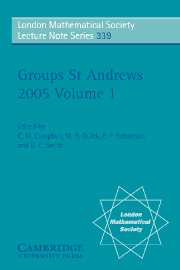Book contents
- Frontmatter
- Contents
- Introduction
- Aspects of infinite permutation groups
- Self-similarity and branching in group theory
- On surface groups: motivating examples in combinatorial group theory
- Nilpotent p-algebras and factorized p-groups
- Classification of finite groups by the number of element centralizers
- Algorithmic use of the Mal'cev correspondence
- Minimal but inefficient presentations for semi-direct products of finite cyclic monoids
- The modular isomorphism problem for finite p-groups with a cyclic subgroup of index p2
- On one-generated formations
- New results on products of finite groups
- Radical locally finite T-groups
- Explicit tilting complexes for the Broué conjecture on 3-blocks
- Conjugacy classes of p-regular elements in p-solvable groups
- An algorithm for the unit group of the Burnside ring of a finite group
- Integral group ring of the first Mathieu simple group
- Embedding properties in direct products
- Malcev presentations for subsemigroups of groups — a survey
- Finite groups with extremal conditions on sizes of conjugacy classes and on degrees of irreducible characters
- Conjugacy class structure in simple algebraic groups
- On automorphisms of products of groups
- Linear groups with infinite central dimension
- G-automata, counter languages and the Chomsky hierarchy
- An embedding theorem for groups universally equivalent to free nilpotent groups
- Irreducible word problems in groups
- Recent growth results
Explicit tilting complexes for the Broué conjecture on 3-blocks
Published online by Cambridge University Press: 07 May 2010
- Frontmatter
- Contents
- Introduction
- Aspects of infinite permutation groups
- Self-similarity and branching in group theory
- On surface groups: motivating examples in combinatorial group theory
- Nilpotent p-algebras and factorized p-groups
- Classification of finite groups by the number of element centralizers
- Algorithmic use of the Mal'cev correspondence
- Minimal but inefficient presentations for semi-direct products of finite cyclic monoids
- The modular isomorphism problem for finite p-groups with a cyclic subgroup of index p2
- On one-generated formations
- New results on products of finite groups
- Radical locally finite T-groups
- Explicit tilting complexes for the Broué conjecture on 3-blocks
- Conjugacy classes of p-regular elements in p-solvable groups
- An algorithm for the unit group of the Burnside ring of a finite group
- Integral group ring of the first Mathieu simple group
- Embedding properties in direct products
- Malcev presentations for subsemigroups of groups — a survey
- Finite groups with extremal conditions on sizes of conjugacy classes and on degrees of irreducible characters
- Conjugacy class structure in simple algebraic groups
- On automorphisms of products of groups
- Linear groups with infinite central dimension
- G-automata, counter languages and the Chomsky hierarchy
- An embedding theorem for groups universally equivalent to free nilpotent groups
- Irreducible word problems in groups
- Recent growth results
Summary
Abstract
The Broué conjecture, that a block with abelian defect group is derived equivalent to its Brauer correspondent, has been proven for blocks of cyclic defect group and verified for many other blocks, mostly with defect group C3 × C3 or C5 × C5. In this paper, we exhibit explicit tilting complexes from the Brauer correspondent to the global block B for a number of Morita equivalence classes of blocks of defect group C3 × C3. We also describe a database with data sheets for over a thousand blocks of abelian defect group in the ATLAS group and their subgroups.
Introduction
Let G be a finite group and let k be a field of characteristic p, where p divides |G|. Let kG =⊕ Bi be a decomposition of the group algebra into blocks, and let Di be the defect group of the block Bi, of order. By Brauer's Main Theorems (see [1] for an accessible exposition) there is a one-to-one correspondence between blocks of kG with defect group Di and blocks of kNG(Di) with defect group Di. Let bi be the block corresponding to Bi, called its Brauer correspondent.
Broué [5] has conjectured that if Di is abelian and Bi is a principal block, then Bi and bi are derived equivalent, i.e., the bounded derived categories Db(Bi) and Db(bi) are equivalent. In fact, it is generally believed by researchers in the field that the hypothesis that Bi be principal is unnecessary.
- Type
- Chapter
- Information
- Groups St Andrews 2005 , pp. 207 - 223Publisher: Cambridge University PressPrint publication year: 2007

